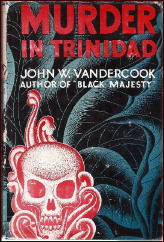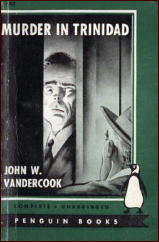Fri 21 Feb 2014

JOHN W. VANDERCOOK – Murder in Trinidad. Doubleday Crime Club, hardcover, 1933. Penguin #552, paperback, 1944. Macmillan, hardcover, 1955. Collier, paperback, 1961.
My admiration for Arthur Conan Doyle goes up a notch whenever I read a book like this, and while you may know what I mean by that, perhaps you won’t, and I’ll explain.
The first few chapters of this book recount the first meeting between Bertram Lynch, ace investigator for the P.C.B., and Robert Deane, instructor at Yale and an amateur criminologist. Lynch, as was typical of the times, is the eccentric detective of the pair, and Deane is his “faithful” assistant. They are no Holmes and Watson by any means, however, and after a decent enough beginning, the book is sadly disappointing. [FOOTNOTE]
The initials P.C.B. need some explaining as well. (If you didn’t know, you’d never guess.) They stand for the Permanent Central Board, a branch of the League of Nations. Lynch’s job in this case is running down a gang of opium smugglers working out of the West Indies, and in the process he comes across a 13 year old murder to solve.
He also does a good many things that are a great puzzlement to both Deane and the reader, most of which are explained later, but not until a point has been reached that anyone cares — or cares to point out that most of them didn’t work out early as well as they were supposed to.
I won’t go into details of all the examples I have in mind — and you’re quite welcome, I’m sure! — but the one that puzzled me the most, all of the way through, is why, once Lynch is convinced that his purpose on the island is known (page 22) he decides to go undercover and infiltrate the bad guys by pretending to be on the run from the law. Under his own name and description. (See the constabulary orders on page 74.)

[WARNING: PLOT ALERT] It turns out that the bad guys don’t communicate very well with each other, so it doesn’t affect the plan any, but Lynch didn’t know this, I didn’t know this, and none of the rest of the book made much sense either. At one point Lynch and Deane have been captured, but instead of being killed outright (if I were a bad guy, I’d be a nasty bad guy) they’re tied up in sa shack and the head bad guy waits outside to pop them off as they work themselves free and try to make a break for it.
The plot fails. Lynch and Deane get away. Ho hum.
Which just about sums it up. This is the first of four adventures the two men had together. Besides this one, they solved cases together in Fiji (1936), Haiti (1956) and New Guinea (1959). If you happen to know why there was such a long break in their career, I’d like to hear about it. Obviously Lynch wasn’t working for the League of Nations all this time. (And maybe later cases were better than this one.)
FOOTNOTE: As you may have noticed, I used the word “faithful” in quotes to describe Deane’s status as Lynch’s Watson in this book. By page 227, Deane gets a little truculent at Lynch’s orders without explanations: “This is all very amusing and all that. But you’ve got to talk sense. What, in plain words, is the idea? Tell me or I quit.” You’ve got to admire a guy like that.
February 21st, 2014 at 7:02 pm
Funny you should mention Holmes and Watson: This was filmed in 1934 with Nigel Bruce as Lynch. William K.Everson liked it quite a lot, but it doesn’t seem to be available anywhere.
February 21st, 2014 at 7:38 pm
Dan
From Hubin:
Film: TCF [20th Century Fox], 1934. Also: TCF, 1939, as Mr. Moto in Danger Island; also released as Danger Island; and as Mr. Moto on Danger Island. Also: TCF, 1945, as The Caribbean Mystery.
February 21st, 2014 at 7:25 pm
I have one of Vandercook’s books in paperback, Murder in Lima. I’ve never read it. Probably never will.
February 21st, 2014 at 7:40 pm
Bill
I could picture the cover immediately, but Vandercook didn”t write that one (Lima). It was Robert Levey (Avon, PBO, 1957).
February 21st, 2014 at 8:05 pm
Hubin doesn’t mention the Nigel Bruce film? Everson noted that the film was re-made as a Mr. Moto flick.
February 21st, 2014 at 8:13 pm
Dan
I was being too concise. The first version listed, TCF [20th Century Fox], 1934, is the one with Nigel Bruce.
http://www.imdb.com/title/tt0025526/reference
And of course now that you’ve pointed the movie out to me, you can add me to the long line of people who’d love to see it. (I’m assuming that there is a long line.)
February 24th, 2014 at 4:40 pm
There is a long line, and I’ve been in it since the Everson book too. I like the Lynch and Deane books better than this, but admit they are more thrillers than actual detective stories.
John Vandercook, as I pointed out in my own earlier review here, was a noted announcer on radio, whose broadcast revealing the attack on Pearl Harbor is available on-line as an important piece of living history.
The Deane part in the Mr. Moto film is filled by Nat Pendleton, so you can imagine how that goes.
February 24th, 2014 at 7:11 pm
David
I’d totally forgotten your previous overview of the Vandercook books till you mentioned it.
Here’s the link: https://mysteryfile.com/blog/?p=1078
It appeared on this blog some five years ago, so maybe I can be excused not remembering it, just a little perhaps.
I note you point out about this one that:
Anthony Boucher said: “It’s at once a rousing novel of tropic adventure .. and an unusually tight and satisfying deductive puzzle …â€
…while I on the other hand wasn’t all that impressed with the puzzle aspect. I’m tempted to read the book again, but all in all, realistically speaking, I probably won’t.